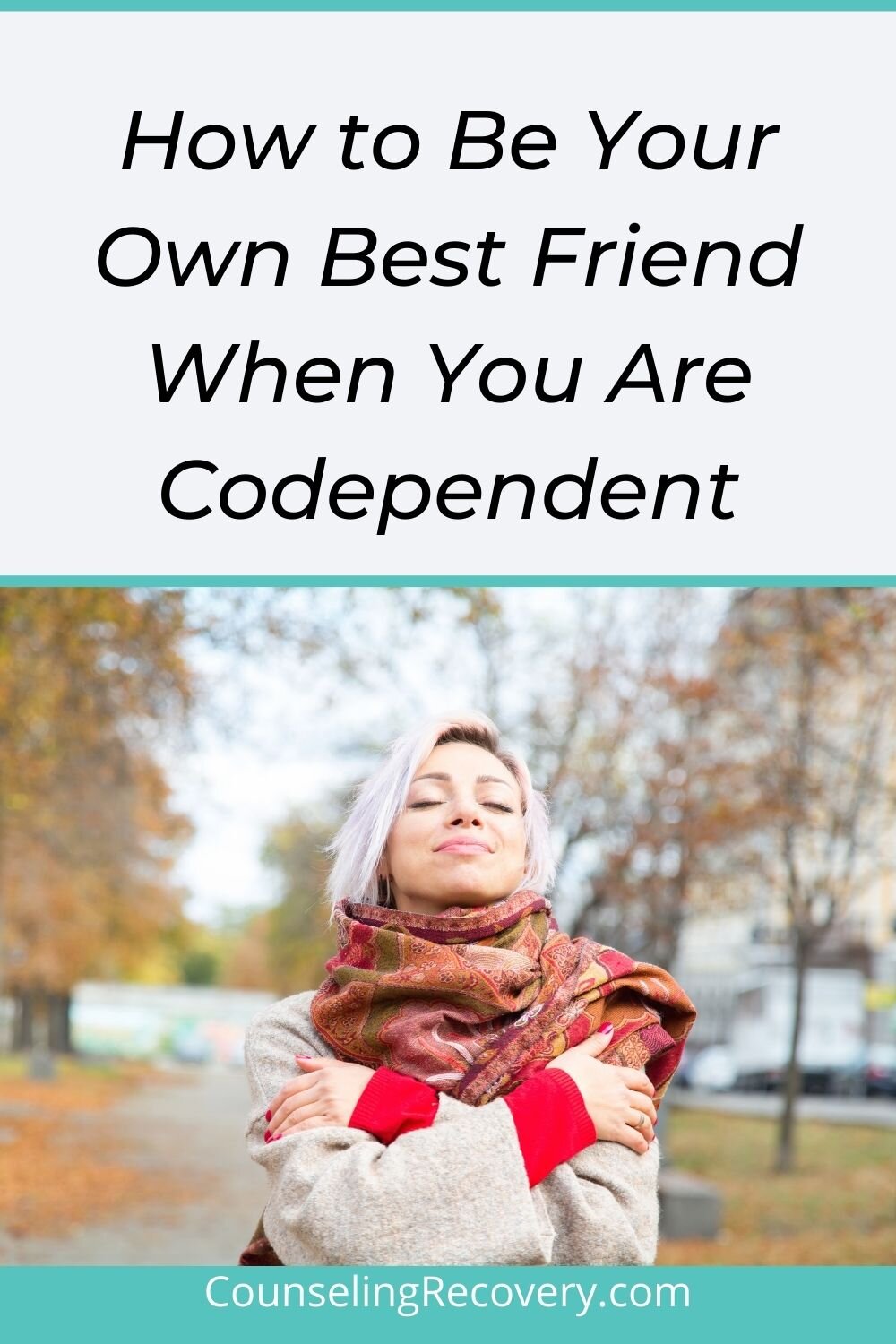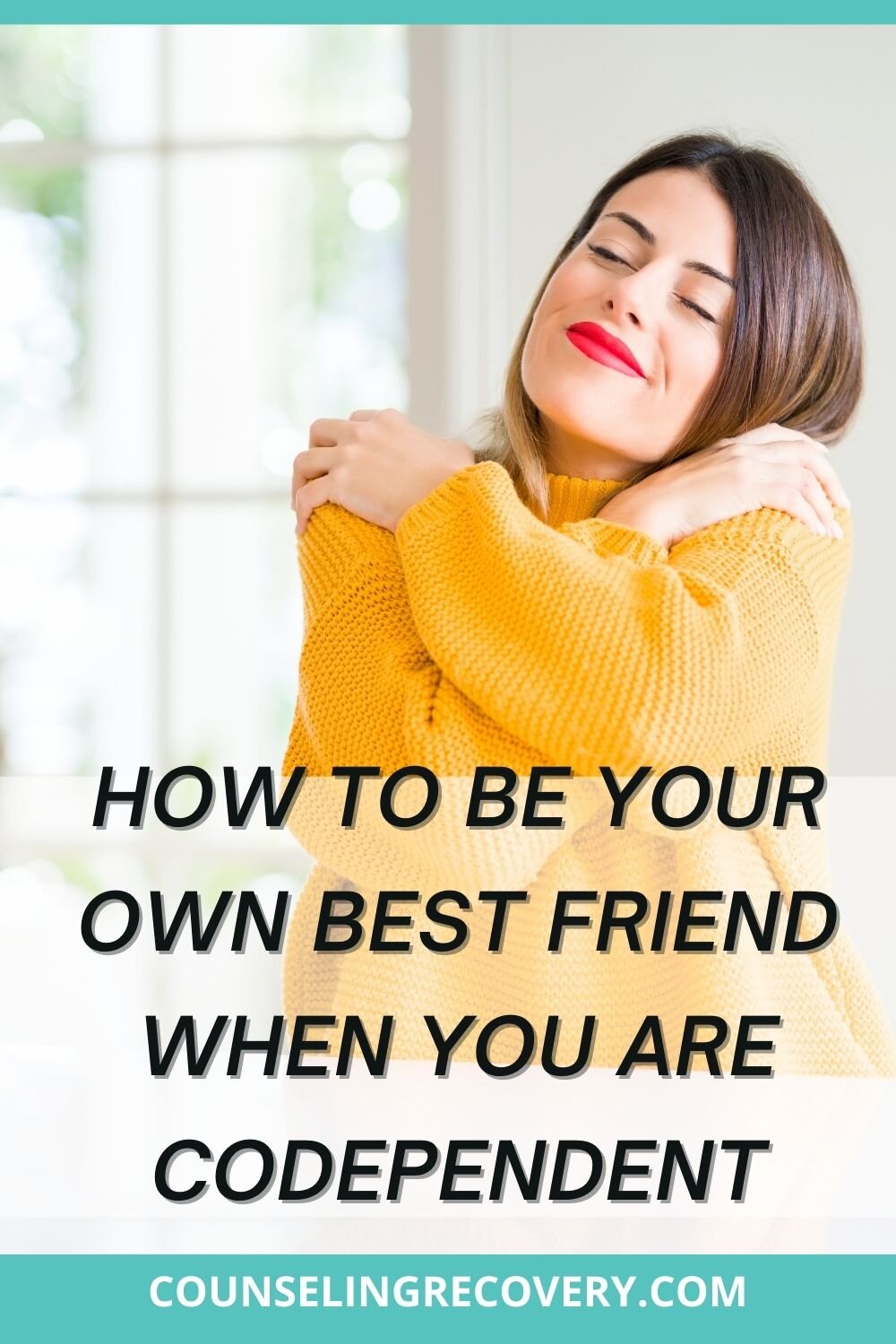How to Be Your Own Best Friend in Codependency Recovery
How to Be Your Own Best Friend When You are a Codependent
When you're codependent, the saying "be your own best friend" feels like a foreign concept. Being hyper-focused on others creates an unhealthy dependency that turns relationships into lifelines. Coupled with getting other people’s approval, you begin to lose your own identity.
You look for external validation instead of trusting your own perceptions.
If this sounds familiar, you’re not alone. Many people who struggle with codependency don’t know how to trust themselves.
For instance, if your parent denied their alcoholism or rage, your own perceptions get dismissed and as a result, you don’t trust your own perceptions. You start to depend on outside sources for validation because you can’t do it for yourself.
And so the path of codependency begins.
Self-esteem and self-trust are primary challenges when you consider yourself codependent. Giving and helping others starts to define you rather than being a conscious choice.
Learning how to befriend and trust ourselves feels foreign but it’s the start of codependency recovery.
When you struggle with codependency you:
Get your self-worth from what you do, not who you are.
Have difficulty asking for what you need.
Depend on others to make you feel happy.
Feel joy only when loved ones are happy too.
Feel other people’s feelings more than our own.
Look to others for answers because you don’t trust yourself.
What Is Codependency?
Codependency is a relationship pattern of hyper-focusing on others at your own expense. For instance, when your loved one has a bad day, so do you. Their problems become your problems, their needs overshadow yours.
Your sense of self is built around what others need verse what’s best for you.
Eventually, relationships become one-sided as you neglect yourself in favor of pleasing others. Because of being externally focused, self-reliance doesn’t develop. Many experts consider codependency a "relationship addiction" much like alcoholism.
Confronting Issues of Emotional Dependency in Codependency
Often, codependent people don’t see their own dependency until a relationship ends. That's when you feel like you've been punched in the stomach - when a relationship fails and you’re alone again.
At the heart of codependency is an unconscious need to make someone else your Higher Power. Because there is a lack of self-trust, you look to others for validation, approval, and support.
It's like waiting for your prince or princess to save you - only that person doesn't have to be a romantic partner. Codependency can develop with a friend, a child, a mentor, anyone that you find yourself needing just a little too much.
When they're happy with you, you feel like the hero, but if they're upset, it’s crushes you. Your feelings become dictated by their moods. It's an emotional rollercoaster that never seems to stop.
Acknowledge that Codependency Doesn’t Work
Unfortunately, when you’re codependent person you don’t hit bottom easily. Seeing our own problematic behaviors takes time. Caring “too much” makes us feel needed so changing this behavior is usually met with resistance.
Losing yourself in relationships creates such internal suffering that eventually you become exhausted enough to let go. Ironically, admitting your powerlessness over people. places and things is what helps you begin to recover.
Developing Self-trust In Codependency
Learning how to trust yourself means making a conscious effort to attend to your own needs. Instead of getting lost in other people’s problems, pay attention to your own. This means tuning into your own emotions and developing your intuition instead of dismissing them as silly.
In other words, give yourself some much needed attention and grace. Self-trust takes practice but over time, you will form a stronger sense of self that becomes your new guide post. Decisions will be based on what you think instead of what you think others want.
This is how you begin to trust yourself.
My Lesson - Be Your Own BFF as a Codependent
For me, depending on relationships too much was a very painful lesson. Women’s friendships run deep, like a sisterhood. So, when a close friendship ended, it knocked me off my center. Despite working on my codependency for decades, I didn’t see it coming.
After months of heartbreak, I learned one of the most important lessons in my life. You cannot trust others without first trusting yourself. Trying to to fill yourself up with other people’s love and attention is short-sighted.
There will never be enough for you because outside validation doesn’t last.
In codependency recovery the primary goal is to learn how to validate and affirm yourself. Without self-trust, lasting recovery will be elusive.
How Do You Trust Yourself When You’re Codependent?
Listen to yourself.
Your thoughts, feelings and perceptions provide important information and when these messages are consistently honored, you will learn to use them to make healthier choices. When you need feedback, reason things out with a trusted friend.
Use any pain or resistance you feel to connect deeper with yourself. Sit with your feelings rather than dismissing them. Take a walk in nature or do some journal writing to cultivate that connection within yourself. Act as if you trust yourself and with time that will become a working part of the mind.
Tips for Developing Self-trust:
Change any negative self-talk into positive messages
If needed, borrow positive messages from people who love you
Cultivate a practice of self-care that works for you
When upsetting things happen consider your feelings first
Remember that making mistakes is how we learn, no one is perfect
Without a strong sense of self, others can still dictate our self-esteem. No one single person - even your partner - should determine your worth.
Consider Working a 12 Step Program
Recovery from codependency takes village; meaning it shouldn’t be done in isolation. Consider attending Al-Alanon or Codependent Anonymous meetings for additional support. These 12 step groups provide a thorough road map including mentors to make the process less painful and infinitely more supportive.
Final Thoughts
Recovery from codependency means being willing to confront issues of dependency and shift towards self-reliance. Treating yourself like you would your best friend is an integral part of recovery because this relationship will be the longest and most important one you ever have.



